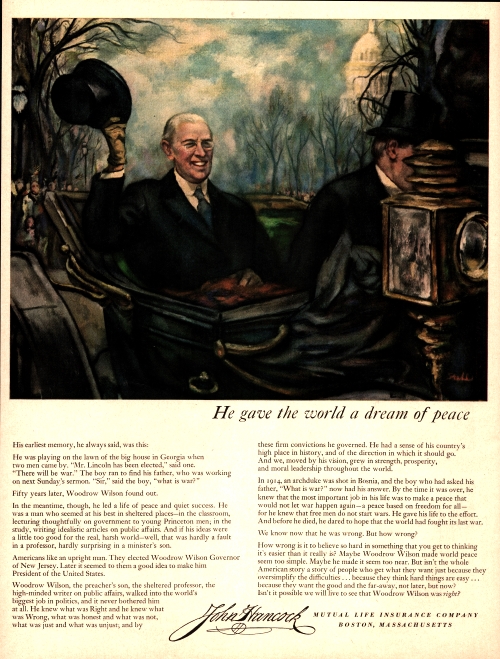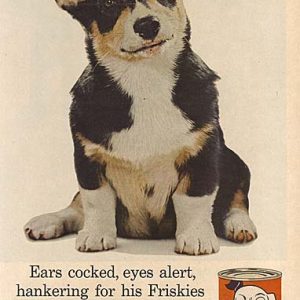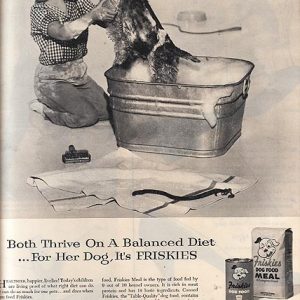Description
 Full color 9 1/2″ x 13 1/2″ ad for the John Hancock Mutual Life Insurance Company. There is a painting of a very happy Woodrow Wilson being driving around in a carriage as he doffs his hat to wave at people alongside his route. The headline says that “He gave the world a dream of peace” and the text states just how that was so. “His earliest memory, he always said, was this: He was playing on the lawn of the big house in Georgia when two men came by. ‘Mr. Lincoln has been elected.’ said one. ‘There will be war.’ The boy ran to find his father, who was working on next Sunday’s sermon. ‘Sir,’ said the boy, ‘what is war?’ Fifty years later, Woodrow Wilson found out. In the meantime, though, he led a life of peace and quiet success. He was a man who seemed at his best in sheltered places – in the classroom, lecturing thoughtfully on government to young Princeton men; in the study, writing idealistic articles on public affairs. And if his ideas were a little too good for the real, harsh world – well, that was hardly a fault in a professor, hardly surprising in a minister’s son. Americans like an upright man. They elected Woodrow Wilson Governor of New Jersey. Later it seemed to them a good idea to make him President of the United States. Woodrow Wilson, the preacher’s son, the sheltered professor, the high-minded writer on public affairs, walked into the world’s biggest job in politics, and it never bothered him at all. He knew what was Right and he knew what was Wrong, what was honest and what was not, what was just and what was unjust; and by these firm convictions he governed. He had a sense of the country’s high place in history, and of the direction in which it should go. And we, moved by his vision, grew in strength, prosperity and moral leadership throughout the world. In 1914, an archduke was shot in Bosnia, and the boy who had asked his father, ‘What is war?’ now had his answer. By the time it was over, he know that the most important job in his life was to make a peace that would not let war happen again – a peace based on freedom for all – for he knew that free men do not start wars. He gave his life to the effort. And before he died, he dared to hope that the world had fought its last war. We know now that he was wrong. But how wrong? How wrong is it to believe so hard in something that you get to thinking it’s easier than it really is? Maybe Woodrow Wilson made world peace seem too simple. Maybe he made it seem too near. But isn’t the whole American story a story of people who get what they want just because they oversimplify the difficulties…because they think hard things are easy…because they want the good and the far-away, not later, but now? Isn’t it possible we will live to see that Woodrow Wilson was right?”
Full color 9 1/2″ x 13 1/2″ ad for the John Hancock Mutual Life Insurance Company. There is a painting of a very happy Woodrow Wilson being driving around in a carriage as he doffs his hat to wave at people alongside his route. The headline says that “He gave the world a dream of peace” and the text states just how that was so. “His earliest memory, he always said, was this: He was playing on the lawn of the big house in Georgia when two men came by. ‘Mr. Lincoln has been elected.’ said one. ‘There will be war.’ The boy ran to find his father, who was working on next Sunday’s sermon. ‘Sir,’ said the boy, ‘what is war?’ Fifty years later, Woodrow Wilson found out. In the meantime, though, he led a life of peace and quiet success. He was a man who seemed at his best in sheltered places – in the classroom, lecturing thoughtfully on government to young Princeton men; in the study, writing idealistic articles on public affairs. And if his ideas were a little too good for the real, harsh world – well, that was hardly a fault in a professor, hardly surprising in a minister’s son. Americans like an upright man. They elected Woodrow Wilson Governor of New Jersey. Later it seemed to them a good idea to make him President of the United States. Woodrow Wilson, the preacher’s son, the sheltered professor, the high-minded writer on public affairs, walked into the world’s biggest job in politics, and it never bothered him at all. He knew what was Right and he knew what was Wrong, what was honest and what was not, what was just and what was unjust; and by these firm convictions he governed. He had a sense of the country’s high place in history, and of the direction in which it should go. And we, moved by his vision, grew in strength, prosperity and moral leadership throughout the world. In 1914, an archduke was shot in Bosnia, and the boy who had asked his father, ‘What is war?’ now had his answer. By the time it was over, he know that the most important job in his life was to make a peace that would not let war happen again – a peace based on freedom for all – for he knew that free men do not start wars. He gave his life to the effort. And before he died, he dared to hope that the world had fought its last war. We know now that he was wrong. But how wrong? How wrong is it to believe so hard in something that you get to thinking it’s easier than it really is? Maybe Woodrow Wilson made world peace seem too simple. Maybe he made it seem too near. But isn’t the whole American story a story of people who get what they want just because they oversimplify the difficulties…because they think hard things are easy…because they want the good and the far-away, not later, but now? Isn’t it possible we will live to see that Woodrow Wilson was right?”
Source: September 22, 1952 Life magazine.



